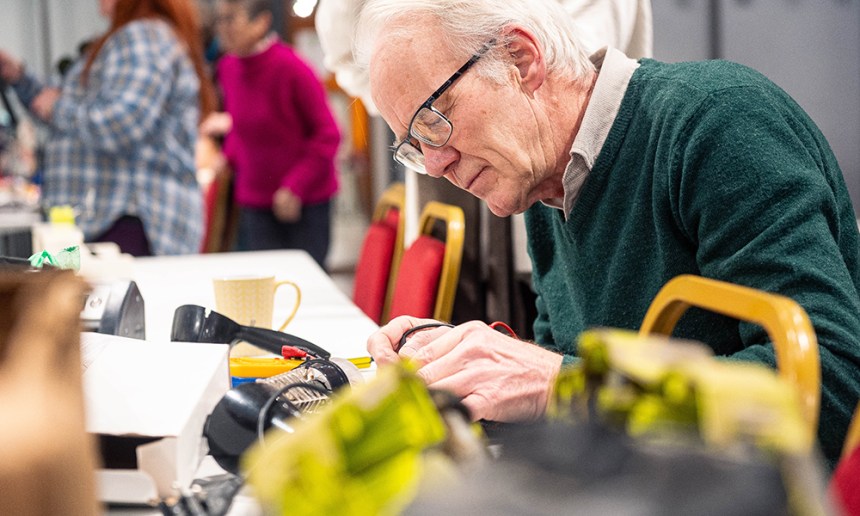CIWM Early Careers Ambassador Dr Nadine Leder explains how a recent research project showcases the untapped potential of repair cafés.
As part of the Hodge Foundation Public Value Research Internship, Cardiff Business School student Yasmine Digby conducted a small-scale study on the role of repair cafés in communities and the challenges they face.
Supervised by myself and Professor Jin Hooi Chan at Greenwich Business School, the research involved interviews with repair café organisers across Wales and England.
The project was supported by Cardiff Business School’s RemakerSpace and repair café Wales.
What were the findings?

Findings revealed that repair cafés provide more than just repair services within a circular economy. They are inclusive, community-centred spaces that bring together people from diverse backgrounds to share skills and form lasting connections.
As a result, repair cafés support intergenerational learning, help building a community and reduce social isolation.
At the heart of these initiatives are facilitating organisations, such as repair café Wales, volunteers, local organisers, and repairers who sustain them. As repair initiatives continue to grow, there are opportunities to further strengthen their impact.
However, overcoming key challenges such as volunteer engagement, financial sustainability, and digitalisation will be essential for their continued growth.
Findings align with the ongoing conversation around the skills gap. Repair cafés continue to benefit from dedicated volunteers, many of whom are retired.
However, attracting a broader demographic, particularly younger generations, could not only strengthen long-term resilience but also support the behaviour change needed to achieve a circular economy.
By strengthening partnerships with local organisations and businesses, valuable learning and training opportunities can be generated, which help developing the capabilities of local repair café teams.
These partnerships could also serve as an incentive for younger people to get involved by allowing them to develop a diverse skill set and gain confidence through hands-on experience.
The impact of product design

Beyond volunteer management, product design also presents a key challenge. In some cases, volunteers are unable to repair products because they are not designed for repairability.
In others, repairers may have concerns about voiding warranties or facing safety and insurance issues. This highlights the need for more policies to support right to repair initiatives, ensuring that repair remains a viable and accessible option.
Financial sustainability is another key factor. Many cafés have already found effective ways to manage their funding. Some benefit from rent-free spaces, while others successfully rely on donations, grants, and local fundraising.
Exploring a range of funding streams could help ensure long-term financial sustainability and support continued growth.
Operational considerations

Repair cafés in Wales contribute to a digital repair data archive. However, given the fast pace of technological development, digitalisation across cafés could further be strengthened.
Occasionally, limited Wi-Fi access in venues can lead to challenges with repair record-keeping when needing to convert to paper-based documentation.
This can make visitor management and repair tracking more complex, highlighting the need for improved digital solutions, such as apps.
Managing visitor flow, especially during busy sessions is another operational consideration linked to digitalisation. Some cafés face difficulties in predicting demand without electronic booking systems, occasionally leading to longer wait times.
Different queue management approaches, such as pre-booking options via an electronic app can help cafés to manage busier periods while maintaining a welcoming atmosphere.
From a logistical perspective, storage and transportation of tools pose challenges, especially for cafés operating across multiple locations.
A more structured approach to tool storage, such as a shared system or a “library of things”, could improve access to equipment and reduce reliance on individual volunteers.
The future of repair cafés
 Repair cafés make a meaningful contribution to sustainability and community wellbeing, but their long-term impact relies on addressing key challenges such as volunteer engagement, financial resilience and digitalisation.
Repair cafés make a meaningful contribution to sustainability and community wellbeing, but their long-term impact relies on addressing key challenges such as volunteer engagement, financial resilience and digitalisation.
Umbrella organisations, such as repair café Wales, play a vital role in supporting these initiatives by providing coordination, administrative support, and a framework for financial sustainability.
With this kind of collective infrastructure, repair cafés can continue to grow, empowering communities and strengthening the transition toward a more circular, repair-focused society.
If you’re interested in learning more about the work of repair cafés or exploring opportunities in this field, you can reach out to Repair Café Wales, or contact the research team.
The post Unlocking the untapped potential of repair cafés appeared first on Circular Online.

